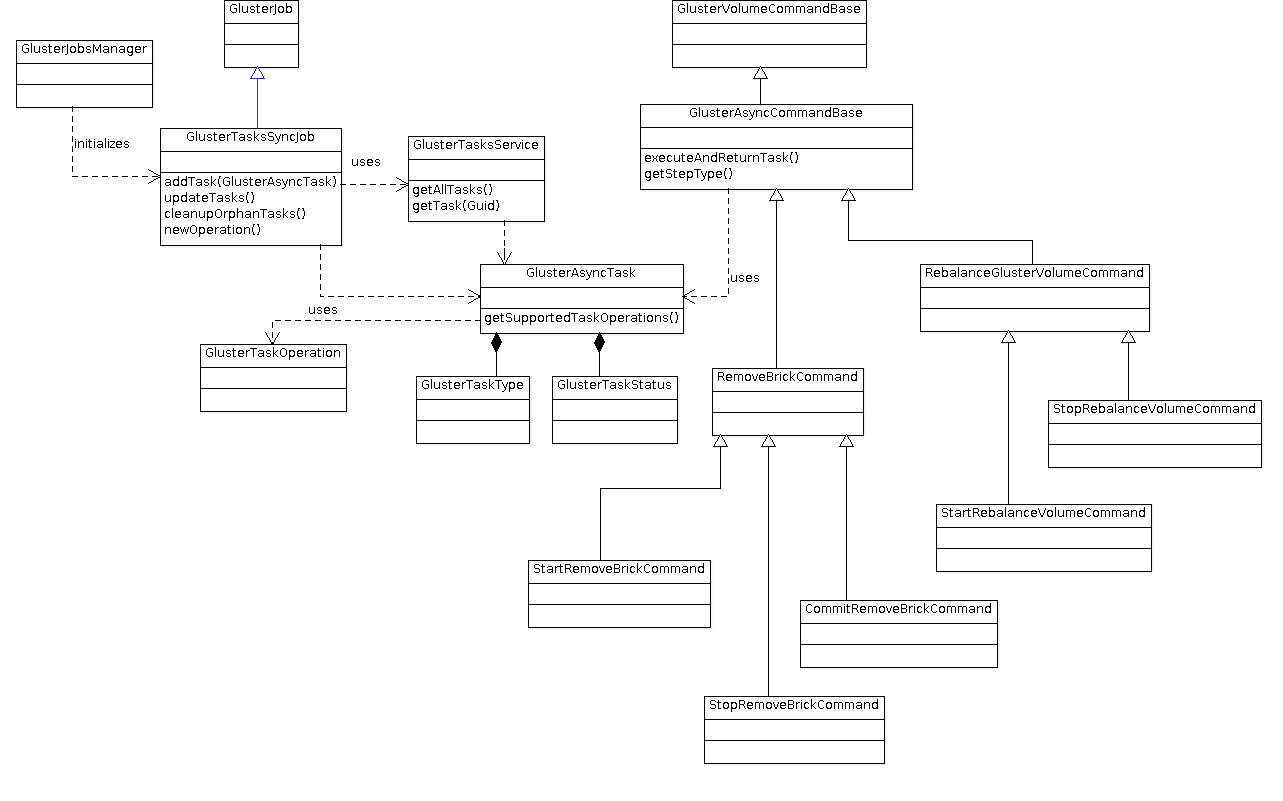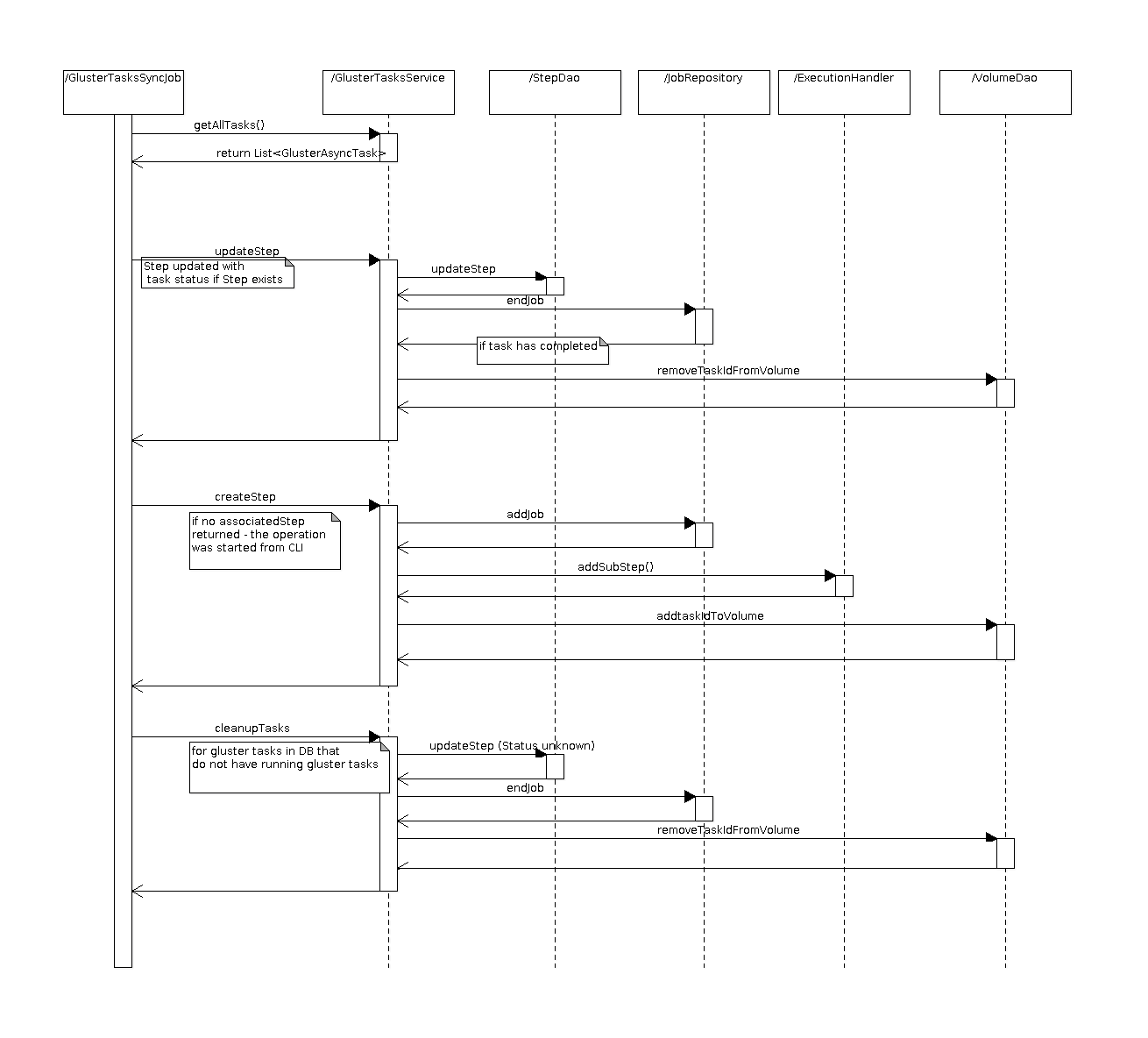Most of them are outdated, but provide historical design context.
They are not user documentation and should not be treated as such.
Documentation is available here.
Detailed Gluster Volume Asynchronous Tasks Management
Gluster Volume Asynchronous Tasks
Summary
This feature provide the support for managing the asynchronous tasks on Gluster volumes. See: Gluster Volume Asynchronous Tasks Management
Owner
- Name: Sahina Bose (Sahina)
- Email: sabose@redhat.com
Current status
- Target Release: TBD
- Status: Development in progress
- Last updated: ,
Design
Database changes
- Change to stored procedure
CheckIfJobHasTasks- Add ‘
GLUSTER’ as external system type to check if a job has tasks.
- Add ‘
- Add a stored procedure
GetStepsByExternalTaskId- Returns the
Stepentities associated with an external task id- used to update status of step when external task status changes.
- Returns the
Entity Changes
gluster_volumes
| Column | Type | Change | Description |
|---|---|---|---|
| taskid | int, nullable | Addition | stores the gluster task id for operation in progress on volume. |
gluster_volume_bricks
| Column | Type | Change | Description |
|---|---|---|---|
| taskid | int, nullable | Addition | stores the gluster task id for operation in progress on brick. |
Class Diagram

GlusterTasksSyncJob- a periodic background job that queries for list of tasks along with status
uses
GlusterTaskService- to get the list of running tasks in cluster
which returns
GlusterAsyncTask- encapsulates information about the Gluster taskGlusterTaskTypeREBALANCEREMOVE_BRICK
GlusterTaskStatusRUNNINGFAILEDCOMPLETEDABORTEDPAUSED
If GlusterTaskService returns a task that is not currently in the database, the information related to the task needs to be persisted in the engine database for further monitoring.
AddInternalJobCommandto be introduced to achieve this
All long running commands will inherit from
- GlusterAsyncCommandBase
- Creates a SUB-STEP on execution of command and associate the step with external task id
- Abstract method
getStepType- inheriting classes to return the StepEnum to be added as Sub step when executing the command - Abstract method
executeAndReturnTaskwhich inheriting classes should implement by calling the corresponding VDS command. The method should return aGlusterAsyncTaskobject that holds the id of the gluster task that was started due to the command. - Start of async operations will acquire a lock. The lock will be released when Stop of corresponding command is called by the user or when the tasks sync job discovers that the task has been completed.
The following sequence diagram explains the Gluster tasks monitoring mechanism 
REST API
-
Add startrebalance action on the gluster volumes resource
/api/clusters/{id}/glustervolumes/{id}/rebalance
This will return a step id which can be monitored from jobs/step api url
-
Add stoprebalance action on the gluster volumes resource
/api/clusters/{id}/glustervolumes/{id}/stoprebalance
This will stop the rebalance action that is currently in progress
-
Modify the delete verb for bricks
DELETE /api/clusters/{id}/glustervolumes/{id}/bricks/
Deletes a collection of bricks without data migration.
-
Add migrate action to the gluster bricks resource
/api/clusters/{id}/glustervolumes/{id}/bricks/migrate
Allow data on collection of bricks to be migrated. This will return a step id which can be monitored from jobs/step api url. If false, data is lost and remove returns synchronously.
-
Add stop migrate action to the gluster bricks resource
/api/clusters/{id}/glustervolumes/{id}/bricks/stopmigrate
This will stop the migration of data from the bricks that is currently in progress
-
Add commit action to the gluster bricks resource
/api/clusters/{id}/glustervolumes/{id}/bricks/commit
This will commit the removal of brick. This can be called only when data is successfully migrated from the brick
How do we monitor the status of the rebalance and remove-brick operations?
-
- Step id will be used to monitor the status of the rebalance and migrate operation. This will be returned once remove or migrate is called
api/jobs/{id}/steps/{id}will contain detailed status if All-Content is set to true